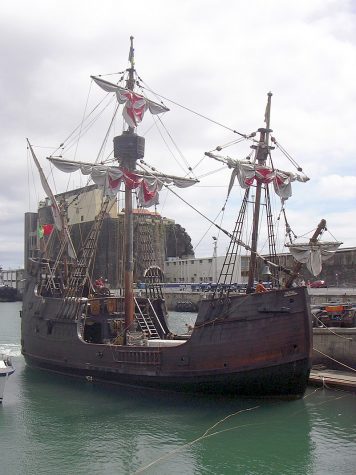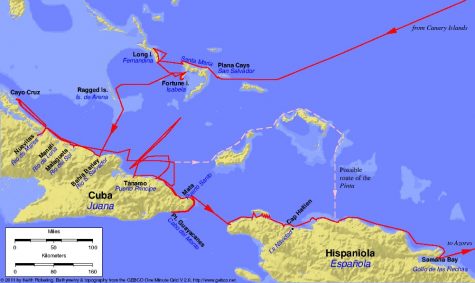Columbus Faces Growing Conflict
October 5, 2018
Christopher Columbus is hardly the virtuous hero who elementary students are introduced to.
Columbus Day became a federal holiday in 1937 when President Franklin D. Roosevelt gave in to efforts from a Catholic group called the Knights of Columbus; over time, the holiday grew into a celebration of Italian-American culture and history.
Columbus was especially important in the 1800s when Italian immigrants faced ethnic and religious discrimination.

Photo By Dietrich Bartel (my father) [CC BY-SA 2.0 (https://creativecommons.org/licenses/by-sa/2.0)], from Wikimedia Commons
However, there is a flaw in depicting Columbus as a hero who could do no wrong.
In History.com’s article, “Columbus Controversy,” the authors discuss how opinions surrounding Columbus have evolved.
“As historians have continued to learn and write more about the real life of Christopher Columbus, controversy has arisen over the validity of honoring the explorer as a hero,” wrote the editors of History.com.
Washington Irving’s book, A History of the Life and Voyages of Christopher Columbus, was the starting point for a majority of the positive information spread about Columbus, and most of the contents were fictionalized to make the explorer more heroic.
Irving’s portrayal turns Columbus into a kindhearted adventurer known for his charitable actions while interacting with native peoples.
In truth, his actions were anything but kind to natives.
During his time in the Caribbean, Columbus enslaved and brutalized the natives for profit.
Thousands of Taino people from Hispaniola were shipped off to Spain, while others were used to mine gold and work on plantations.
While he was governor of what is the Dominican Republic today, Columbus also had many natives killed in order to control revolts.
“In an attempt to deter further rebellion, Columbus ordered their dismembered bodies to be paraded through the streets,” wrote the editors of History.com.
It is often noted that people should not look at past events with a modern sense of morals, but Columbus’ actions were not ideal during his time either.

Photo By Keith Pickering [CC BY-SA 3.0 (https://creativecommons.org/licenses/by-sa/3.0)], from Wikimedia Commons
Today, many places have adopted Indigenous People’s Day in place of Columbus Day in order to honor the native groups of the Americas that suffered from European colonization rather than making Columbus into a hero.
Despite his actions and their consequences, Columbus should not necessarily be forgotten and lost in history; instead, he should be taught in a manner that does not hide the events that took place.
Columbus’ actions were critical in the domino effect that led history to where it is today–including helping Italian immigrants find a place in the United States–but he also committed heinous crimes against those who lived on this section of the world before Europeans arrived.
Erasing the man does not change what happened.




